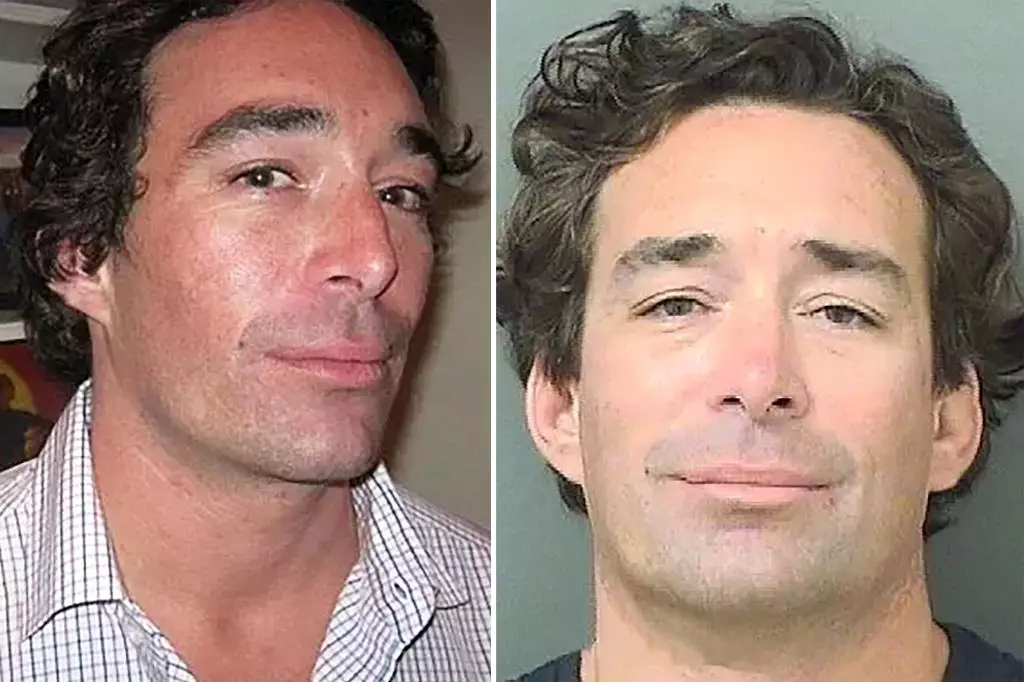Alexander “Nico” Fanjul, a prominent heir to a vast sugar fortune, recently found himself embroiled in significant legal issues after pleading guilty to multiple charges, including felony battery and misdemeanor offenses. His journey from the lap of luxury to a courtroom in Palm Beach, Florida, illustrates a disturbing chapter in a life marked by privilege. Sentenced to four years of probation along with 200 hours of community service, Fanjul’s case reflects the complexities of domestic violence incidents, particularly when they involve individuals from affluent backgrounds.
The details surrounding Fanjul’s arrest are alarming. Following a domestic dispute at his residence, neighbors alerted authorities after hearing distressing screams. Police reports portray a vivid scene, with Fanjul found looming over a woman in a protective stance. The victim reported severe physical assault, leading to significant injuries that spurred fear for her life. Such incidents not only threaten the individuals involved but also unveil the dark undercurrents of wealth and power dynamics in society.
What exacerbates the story is the context in which the incident occurred. Prior to the altercation, Fanjul had dined at the upscale Flagler Steakhouse with the female victim. The police report indicates that Fanjul’s anger stemmed from a disagreement regarding seating next to a same-sex couple. The gravity of his reaction raises eyebrows, particularly against a backdrop of ongoing discussions about acceptance and tolerance in today’s society.
Fanjul’s representative, however, attempted to mitigate the public’s perception by asserting that restaurant staff denied any claims of Fanjul displaying distress over the seating arrangement. This defense speaks to a typical pattern where affluent individuals utilize their resources to obscure the reality of their actions and maintain their public image. The scope of such incidents often leaves victims with a choice: speak out and risk societal backlash or remain silent to avoid further trauma—an indictment of the societal structures in place.
In the wake of his arrest, Fanjul has taken measures towards rehabilitation, checking into a luxury rehab facility in Colorado, known as All Points North. This move has drawn both interest and criticism, raising questions about the effectiveness of exclusive rehabilitation programs. While they may offer superior amenities and therapeutic options, the critiques revolve around whether wealth can effectively shield individuals from facing the true consequences of their actions.
Court documents reveal Fanjul’s permission to reside temporarily in another affluent setting, Sun Valley, Idaho, to continue treatment. Mandated random drug and alcohol tests form part of his outpatient program. However, questions linger about the sincerity of his commitment to change and rehabilitation. Will these rehabilitation efforts go beyond superficiality and incite genuine behavioral transformation, or will Fanjul fall back into patterns of aggression?
The recent developments are not isolated incidents; they are part of a troubling chronology. Fanjul has faced previous domestic violence allegations, including accusations from another ex-girlfriend, Tinsley Mortimer, a figure well-known from her appearances on reality television. Her claims of physical abuse, such as being smothered with a pillow, add weight to the narrative that Fanjul may have a deeper-seated issue with violent behaviour.
The history of domestic violence accusations raises critical concerns about the legal system’s response to wealthy offenders. Despite the sounding alarms of previous victims, the lack of serious repercussions for Fanjul has prompted questions regarding the efficacy of protective laws designed for potential victims of domestic violence.
The case of Alexander “Nico” Fanjul serves as a poignant reminder of the intersection between privilege and accountability. Too often, wealth shields individuals from facing necessary consequences for their actions, leaving victims vulnerable. Fanjul’s journey reflects a broader societal challenge—how to foster accountability among the privileged while supporting victims of domestic violence.
As Nico navigates his rehabilitation process, the hope remains that he will emerge not only as a symbol of reformed character but also as a testament to the importance of confronting and addressing the root causes of violence. The broader implications of his actions spark crucial conversations around accountability, gender dynamics, and the urgent need for comprehensive support systems for victims of domestic violence. Only through such dialogues can society hope to create an environment where all individuals, regardless of socioeconomic status, are held to the same standards of respect and dignity.

